JPoint Student Day: why conference "student day"?
The decision to supplement JPoint 2016 with a “youth” day (with an age limit of 25 years) could raise the question “why do we need it at all”. The fact that the main “adult” part has passed in a big way is not surprising: experts tell about nuances that cannot be done in three minutes. But novice developers, who have not yet come to these nuances, are interested in much more basic things, many of which have already been described a thousand times. Why at all then an event if you can use Stack Overflow at home? What will it reveal to people who already receive specialized education? And what can one day give to those who need many more months of practice? Under the cut - a detailed story about how the Student Day passed, answering these questions.

')
About 300 spectators gathered on Student Day - far less than 1,000 on the “main” part of the JPoint, but the goal of “surpassing adults” was not intended. The fact that at this event newcomers found themselves even in details: at the “big” conference, it was worth the morning to open the doors of the main hall, as the crowd rushes to watch the opening, but still not accustomed to such events, visitors continued to communicate with the robot Fedya.
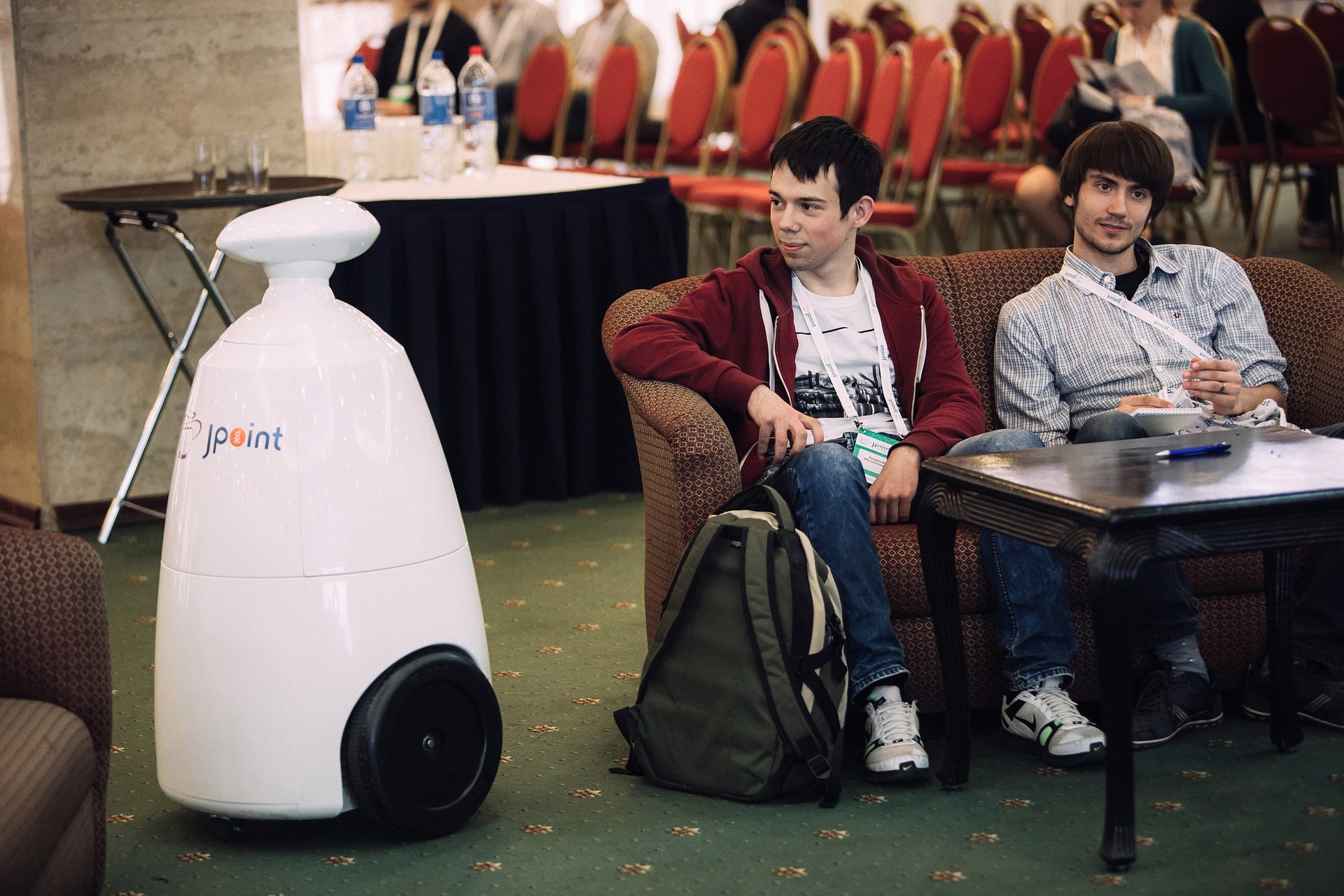
During the opening, program director Andrei real_ales Dmitriev himself raised the question “why do we need this event?” As he explicitly admitted, it will not make advanced specialists from those gathered in one day, followed by employers. But the intention to shove a million concrete facts into the viewer for the day was not there. Instead, Student Day is designed to work at a more general level and help those who come to better understand the areas in which they should develop: understanding only specific examples of code, it is easy to miss important things in the overall picture.

Sponsors also rose to the stage during the opening, and in this case they are especially important. For ambitious newcomers who have not yet had time to establish themselves, the issue of employment is very relevant. And the classmates who sponsored the conference and Sberbank-Technology are not only looking for experienced fighters, but are also ready to educate specialists, from juniors. As a result, the conference gave the two sides the opportunity to meet.
Following on the introductory part “The Missing Link in the Programmer's Training,” conducted by the joint forces of Baruch Sadogursky (JFrog), Roman Elizarov (DevExperts) and Oleg Anastasyev (Odnoklassniki), it was possible to understand why specialized education, such as designed to give answers to all “common »Questions, not well copes with its task. The academic approach does not quite reflect the needs of the real world - and, for example, in the case of multi-threaded programming, according to Elizarov, simply misses some of the important things.
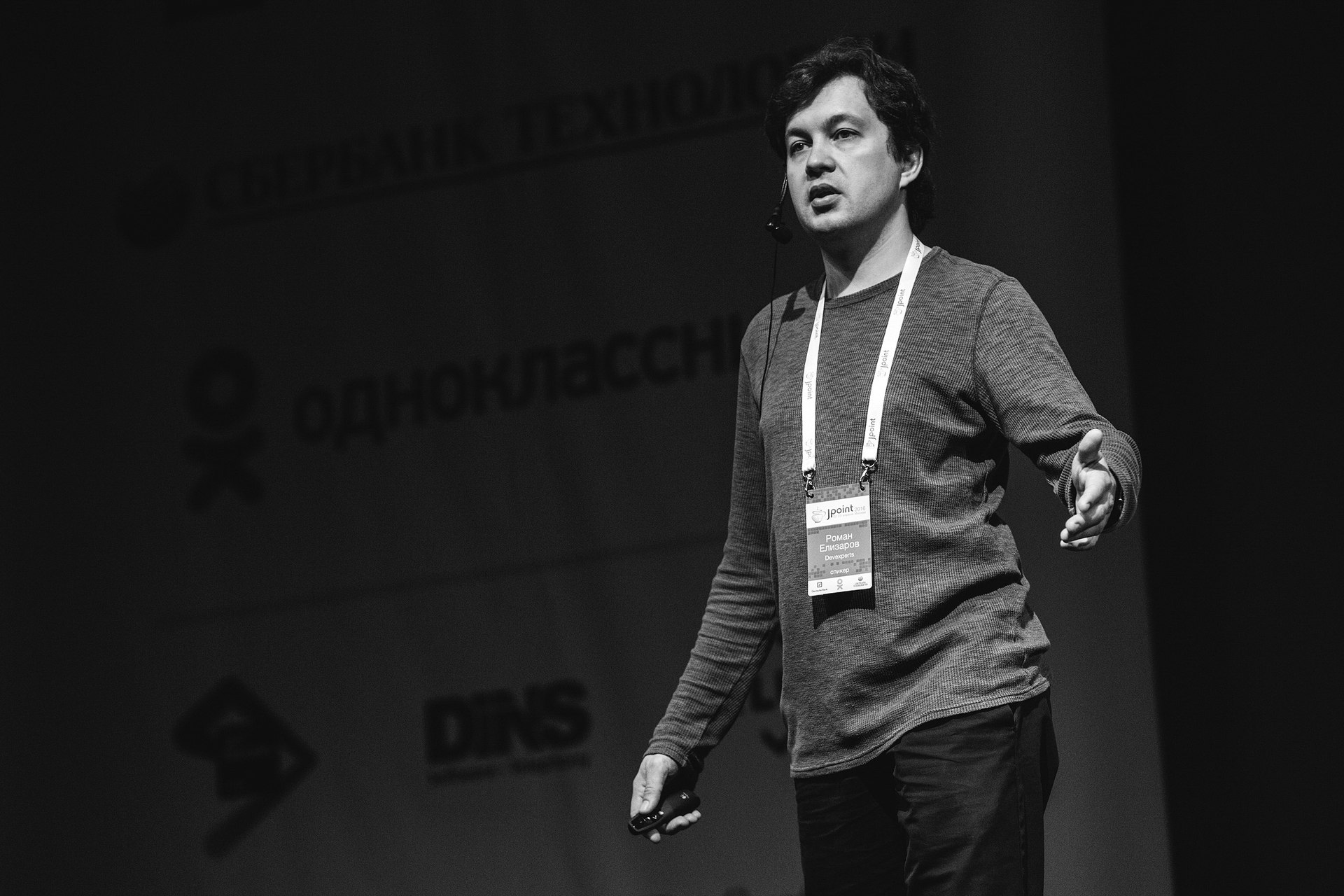
Therefore, after the introduction, when everyone went along different tracks, in the main hall, the same Elizarov turned to a report on multithreading to correct the situation. Meanwhile, in the second hall, Yegor Bugayenko (Teamed.io) took advantage of the fact that the audience had gathered even before the beginning of the report, to ask them and learn more about the tribe by a young, unfamiliar person. For him it was all the more interesting that he spends the bulk of his life in Palo Alto. He was curious, for example, in what language the audience prefers to read about programming (did a generation of Russian developers appear who feel better than English in English?) - the audience responded "which one it is necessary" without giving preference to either of the two. He drew attention to the fact that in the audience the proportion of women was higher than on the “adult” JPoint - it seems that the gender bias in programming is gradually leveling off.
After asking the audience about where they want to be in ten years, it turned out that the majority would like to leave Russia. However, the main reason was not financial or political: the participants criticized the “mess in Russian companies” and talked about their desire to work where the programming culture is at its best. And then a surprise awaited them: Bugayenko said that in his experience, the situation in the West was just sadder, because there the “programmer” had already become from something attracting an ordinary profession, and instead of enthusiasts seeking to achieve perfection, people poured into the industry, wishing to just work out the salary. Someone would probably argue with his position, but in any case it is useful for novice developers to learn such a point of view from a person from the Valley - for some it may affect the most important life choices.
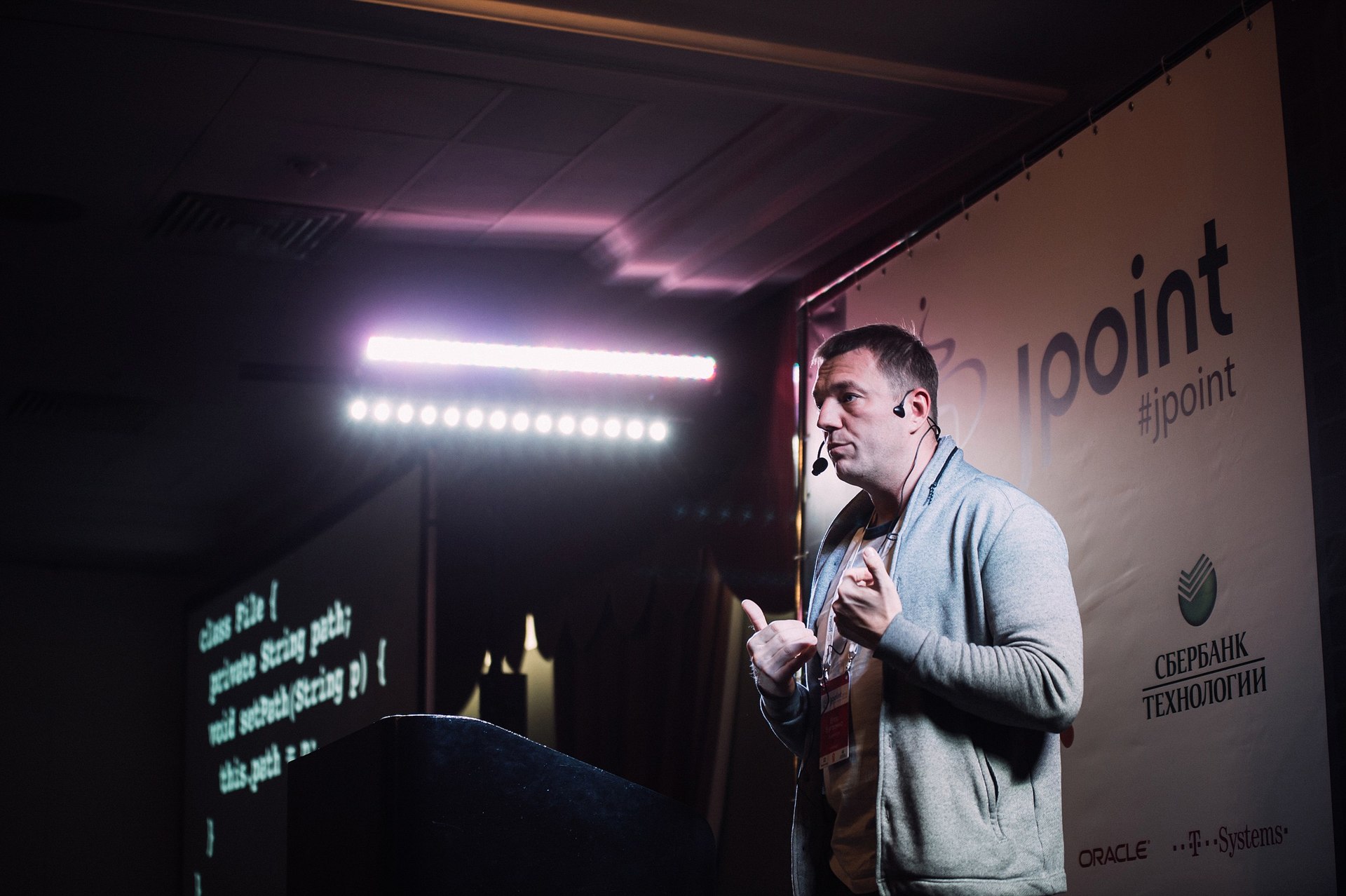
Then the speaker went directly to his report “Object-Oriented Lies” - and in it, too, he began to resolutely tear the assembled templates. He stated from the very beginning that humanity is often completely inappropriate with Java, using object-oriented language as it were, but not learning to think objectively, and eventually destroying what the PLO is good at. His report went from abstract philosophical categories (“if we represent an object as a living being, then we should trust it and should not betray it”) to a specific enumeration of what should not be used: “getters destroy the idea of encapsulation, and Spring and Hibernate are written with the wrong approach. "
The report can be safely called controversial and holivorous. As Bugaenko himself admitted, on the eve of his “adult” conference his report, which also criticized the use of Hibernate, raised many objections from specialists. In David West's book “Object Thinking”, which inspired him in many ways, the author also admits directly in the introduction that the text is “controversial”. Therefore, one can easily disagree with the position of Bugaenko. But in any case, it is useful to learn that it exists, to comprehend it and then to object - and not just blindly use the same technologies as those around you, without thinking deeply about them. And to ask such questions will help one such report better than many texts on specific practical issues.

Following in the main hall, Vladimir Ivanov (Oracle) and Nikita Lipsky (Excelsior) jointly analyzed what is inside the JVM. Of course, this topic can be just google, but here the situation was made by a unique set of speakers. The Oracle employee directly working on the JVM is already far more impressive than the outsider. And here the company was also one of the initiators of the alternative implementation of Java SE. Who, if not them together, know the topic better than anyone else?
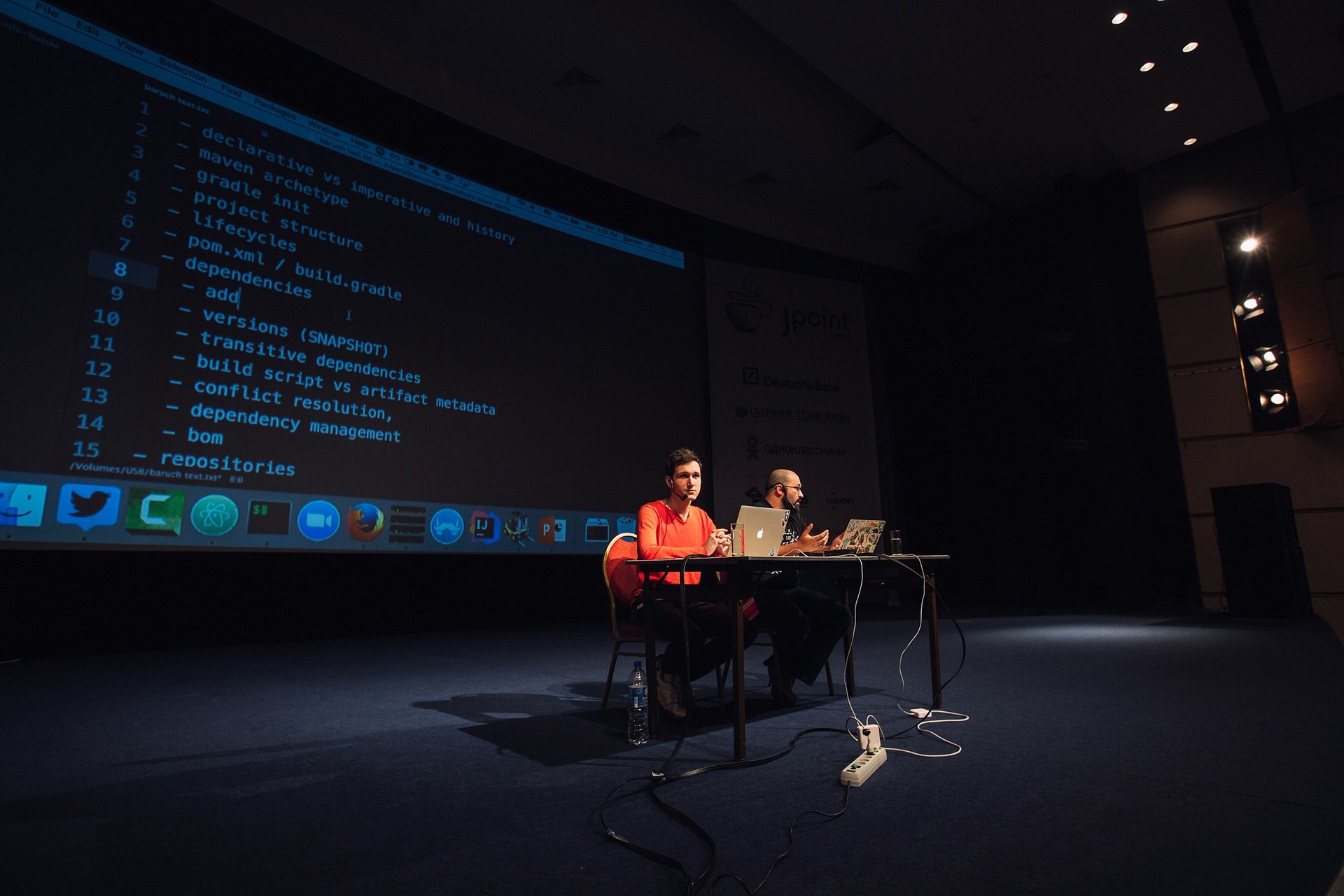
Baruh Sadogursky and Kirill Tolkachev staged a “student” version of the battle of tools for assembly: the idea was similar to what was earlier at the main conference, but there were fewer tools (Maven and Gradle, without SBT), and the educational program for unfamiliar people with the topic was more. At the same time, Anton Arkhipov in another hall climbed into baytkod, and this is a significant moment for the conference. Theoretically, you can write in Java without knowing anything about bytecode, and if you learn the language with the help of the form “Become a great programmer in 24 hours,” you will. But it is useful to be aware of what exactly is happening “under the hood”, and the conference allowed the audience to quickly glance there. For one report, of course, it is impossible to understand everything about baytkod, but this is quite enough to open a new important topic for yourself and continue to study it yourself.
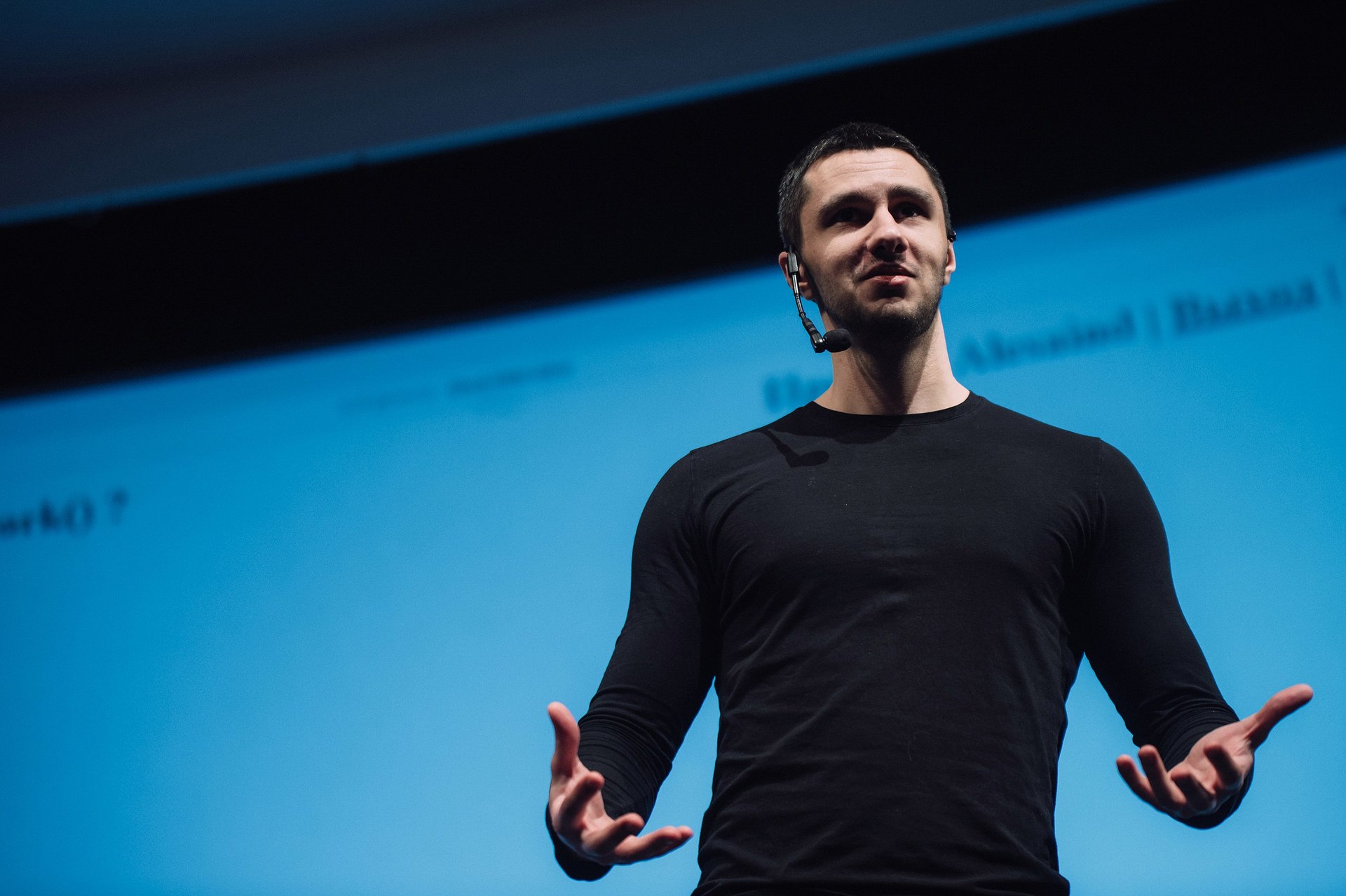
The report by Alexander Matorin “Inadequate Java Interview” partly resembled “Java 8 puzzlers” from the “adult” part of the conference: here, too, it was necessary to decide which of the options was correct in a given situation. But at Matorin, instead of a simple “raise your hands” method, a web interface was used: the participants chose an option on laptops and smartphones, after which the statistics of voice distribution between the options was displayed on the screen. This is not only informative, but it should be psychologically well suited for novice developers who are embarrassed by the gaps in their knowledge: if you don’t pull your hand and press a button, no one will see that you answered incorrectly.
Then Mikhail Glukhikh (JetBrains) talked about Kotlin. The report on it was also at the “adult” conference, but it turned out to be especially relevant here: young developers listened about the young language. Perhaps, among them there is someone who has so far written only “for himself”, who will have the very first professional project right on Kotlin?
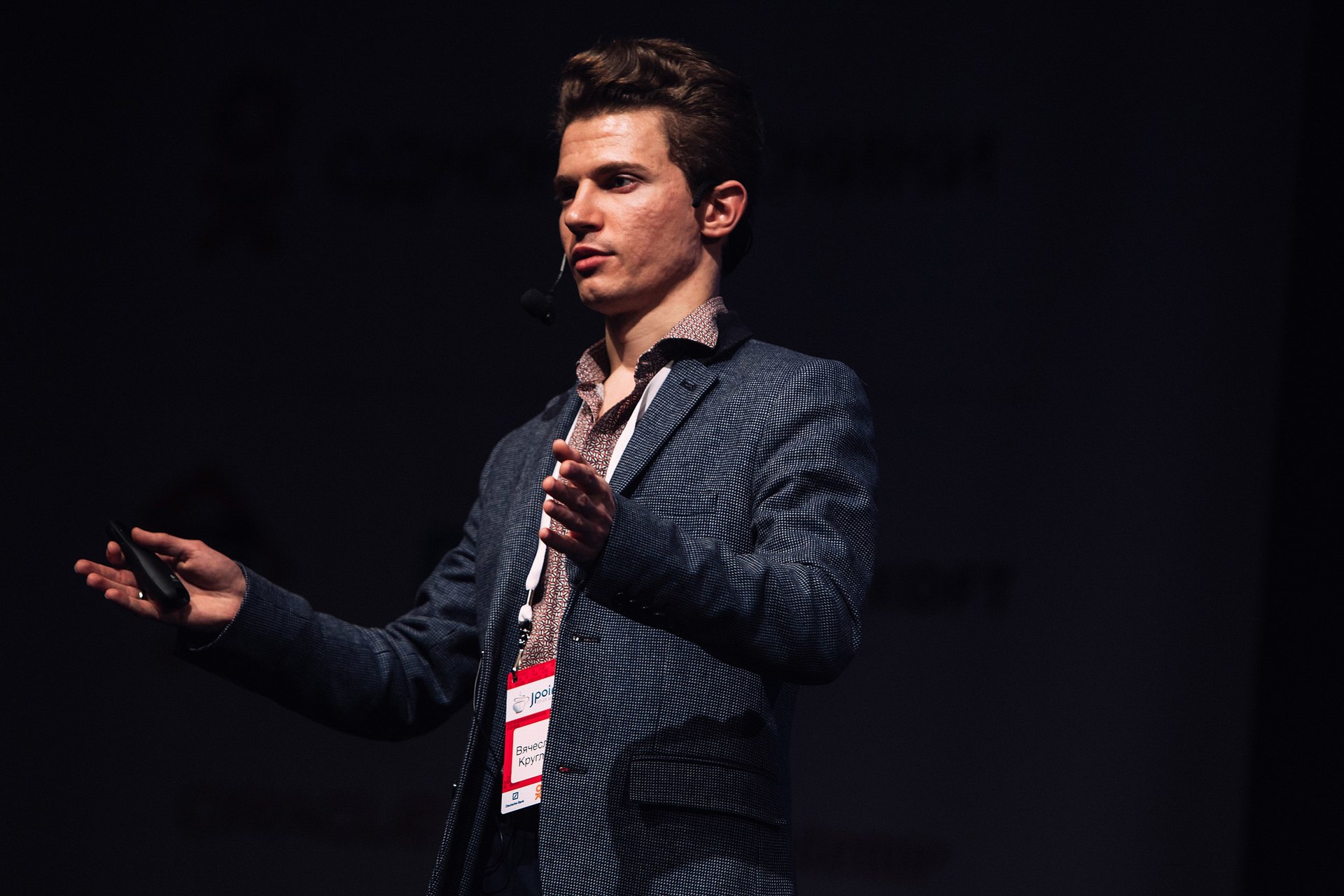
Finally, in the last slot, Vyacheslav Kruglov (T-Systems) talked about working with databases. They talked about using Hibernate, and there was a sharp contrast with the report of Yegor Bugaenko, who criticized the use of Hibernate.
That is, two reports of the conference almost argued with each other. And this means that Student Day, in contrast to Stack Overflow, is not suitable for thoughtless copy-of-life: here, in order to gain benefit, you must begin to think for yourself and draw your own conclusions.
And in programming, this is a very necessary quality - and if the conference helped someone to think, this is a more important result than if it had overwhelmed everyone with their head with specific step-by-step instructions.
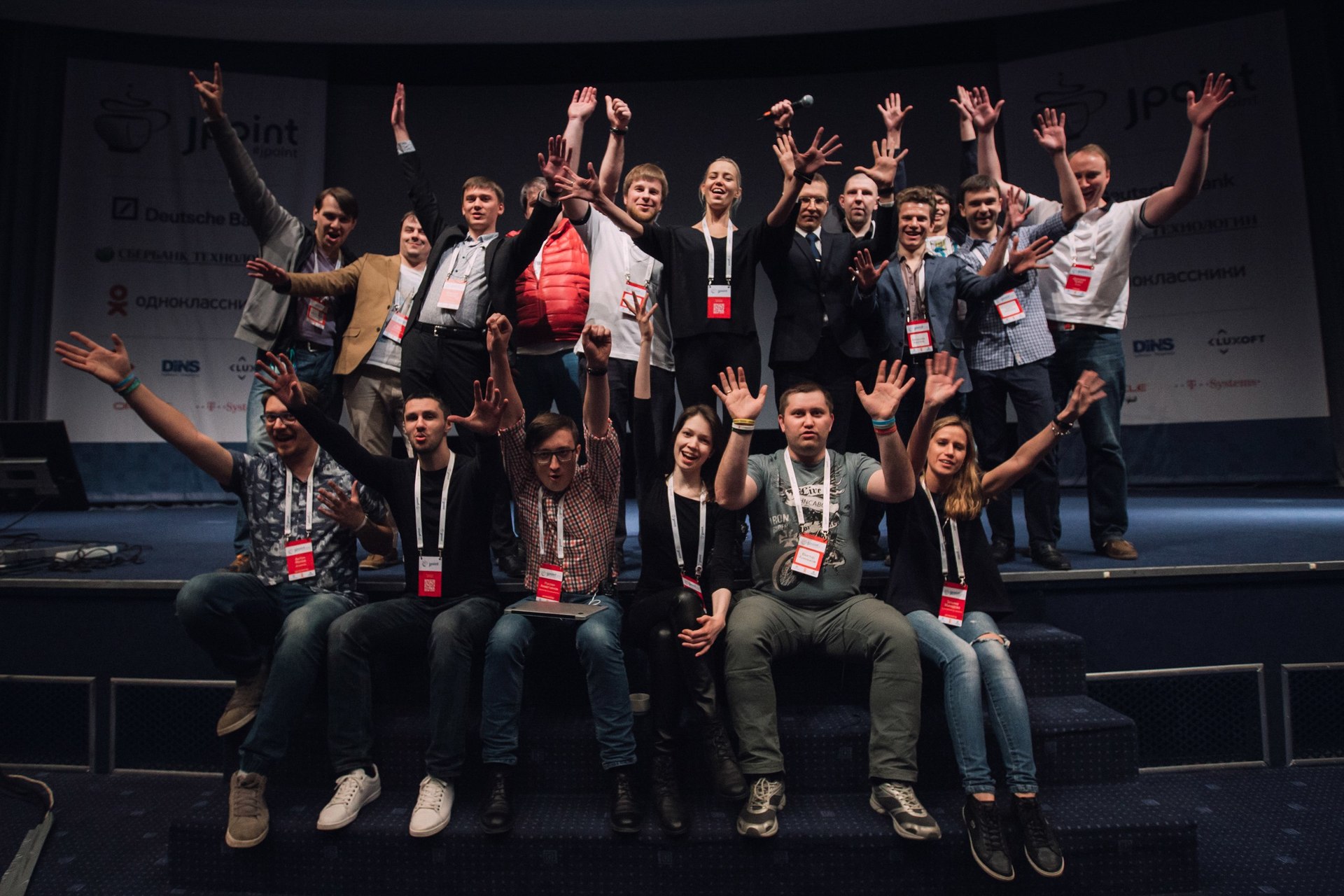

')
About 300 spectators gathered on Student Day - far less than 1,000 on the “main” part of the JPoint, but the goal of “surpassing adults” was not intended. The fact that at this event newcomers found themselves even in details: at the “big” conference, it was worth the morning to open the doors of the main hall, as the crowd rushes to watch the opening, but still not accustomed to such events, visitors continued to communicate with the robot Fedya.

During the opening, program director Andrei real_ales Dmitriev himself raised the question “why do we need this event?” As he explicitly admitted, it will not make advanced specialists from those gathered in one day, followed by employers. But the intention to shove a million concrete facts into the viewer for the day was not there. Instead, Student Day is designed to work at a more general level and help those who come to better understand the areas in which they should develop: understanding only specific examples of code, it is easy to miss important things in the overall picture.

Sponsors also rose to the stage during the opening, and in this case they are especially important. For ambitious newcomers who have not yet had time to establish themselves, the issue of employment is very relevant. And the classmates who sponsored the conference and Sberbank-Technology are not only looking for experienced fighters, but are also ready to educate specialists, from juniors. As a result, the conference gave the two sides the opportunity to meet.
Following on the introductory part “The Missing Link in the Programmer's Training,” conducted by the joint forces of Baruch Sadogursky (JFrog), Roman Elizarov (DevExperts) and Oleg Anastasyev (Odnoklassniki), it was possible to understand why specialized education, such as designed to give answers to all “common »Questions, not well copes with its task. The academic approach does not quite reflect the needs of the real world - and, for example, in the case of multi-threaded programming, according to Elizarov, simply misses some of the important things.

Therefore, after the introduction, when everyone went along different tracks, in the main hall, the same Elizarov turned to a report on multithreading to correct the situation. Meanwhile, in the second hall, Yegor Bugayenko (Teamed.io) took advantage of the fact that the audience had gathered even before the beginning of the report, to ask them and learn more about the tribe by a young, unfamiliar person. For him it was all the more interesting that he spends the bulk of his life in Palo Alto. He was curious, for example, in what language the audience prefers to read about programming (did a generation of Russian developers appear who feel better than English in English?) - the audience responded "which one it is necessary" without giving preference to either of the two. He drew attention to the fact that in the audience the proportion of women was higher than on the “adult” JPoint - it seems that the gender bias in programming is gradually leveling off.
After asking the audience about where they want to be in ten years, it turned out that the majority would like to leave Russia. However, the main reason was not financial or political: the participants criticized the “mess in Russian companies” and talked about their desire to work where the programming culture is at its best. And then a surprise awaited them: Bugayenko said that in his experience, the situation in the West was just sadder, because there the “programmer” had already become from something attracting an ordinary profession, and instead of enthusiasts seeking to achieve perfection, people poured into the industry, wishing to just work out the salary. Someone would probably argue with his position, but in any case it is useful for novice developers to learn such a point of view from a person from the Valley - for some it may affect the most important life choices.

Then the speaker went directly to his report “Object-Oriented Lies” - and in it, too, he began to resolutely tear the assembled templates. He stated from the very beginning that humanity is often completely inappropriate with Java, using object-oriented language as it were, but not learning to think objectively, and eventually destroying what the PLO is good at. His report went from abstract philosophical categories (“if we represent an object as a living being, then we should trust it and should not betray it”) to a specific enumeration of what should not be used: “getters destroy the idea of encapsulation, and Spring and Hibernate are written with the wrong approach. "
The report can be safely called controversial and holivorous. As Bugaenko himself admitted, on the eve of his “adult” conference his report, which also criticized the use of Hibernate, raised many objections from specialists. In David West's book “Object Thinking”, which inspired him in many ways, the author also admits directly in the introduction that the text is “controversial”. Therefore, one can easily disagree with the position of Bugaenko. But in any case, it is useful to learn that it exists, to comprehend it and then to object - and not just blindly use the same technologies as those around you, without thinking deeply about them. And to ask such questions will help one such report better than many texts on specific practical issues.

Following in the main hall, Vladimir Ivanov (Oracle) and Nikita Lipsky (Excelsior) jointly analyzed what is inside the JVM. Of course, this topic can be just google, but here the situation was made by a unique set of speakers. The Oracle employee directly working on the JVM is already far more impressive than the outsider. And here the company was also one of the initiators of the alternative implementation of Java SE. Who, if not them together, know the topic better than anyone else?

Baruh Sadogursky and Kirill Tolkachev staged a “student” version of the battle of tools for assembly: the idea was similar to what was earlier at the main conference, but there were fewer tools (Maven and Gradle, without SBT), and the educational program for unfamiliar people with the topic was more. At the same time, Anton Arkhipov in another hall climbed into baytkod, and this is a significant moment for the conference. Theoretically, you can write in Java without knowing anything about bytecode, and if you learn the language with the help of the form “Become a great programmer in 24 hours,” you will. But it is useful to be aware of what exactly is happening “under the hood”, and the conference allowed the audience to quickly glance there. For one report, of course, it is impossible to understand everything about baytkod, but this is quite enough to open a new important topic for yourself and continue to study it yourself.

The report by Alexander Matorin “Inadequate Java Interview” partly resembled “Java 8 puzzlers” from the “adult” part of the conference: here, too, it was necessary to decide which of the options was correct in a given situation. But at Matorin, instead of a simple “raise your hands” method, a web interface was used: the participants chose an option on laptops and smartphones, after which the statistics of voice distribution between the options was displayed on the screen. This is not only informative, but it should be psychologically well suited for novice developers who are embarrassed by the gaps in their knowledge: if you don’t pull your hand and press a button, no one will see that you answered incorrectly.
Then Mikhail Glukhikh (JetBrains) talked about Kotlin. The report on it was also at the “adult” conference, but it turned out to be especially relevant here: young developers listened about the young language. Perhaps, among them there is someone who has so far written only “for himself”, who will have the very first professional project right on Kotlin?

Finally, in the last slot, Vyacheslav Kruglov (T-Systems) talked about working with databases. They talked about using Hibernate, and there was a sharp contrast with the report of Yegor Bugaenko, who criticized the use of Hibernate.
That is, two reports of the conference almost argued with each other. And this means that Student Day, in contrast to Stack Overflow, is not suitable for thoughtless copy-of-life: here, in order to gain benefit, you must begin to think for yourself and draw your own conclusions.
And in programming, this is a very necessary quality - and if the conference helped someone to think, this is a more important result than if it had overwhelmed everyone with their head with specific step-by-step instructions.

Source: https://habr.com/ru/post/301766/
All Articles